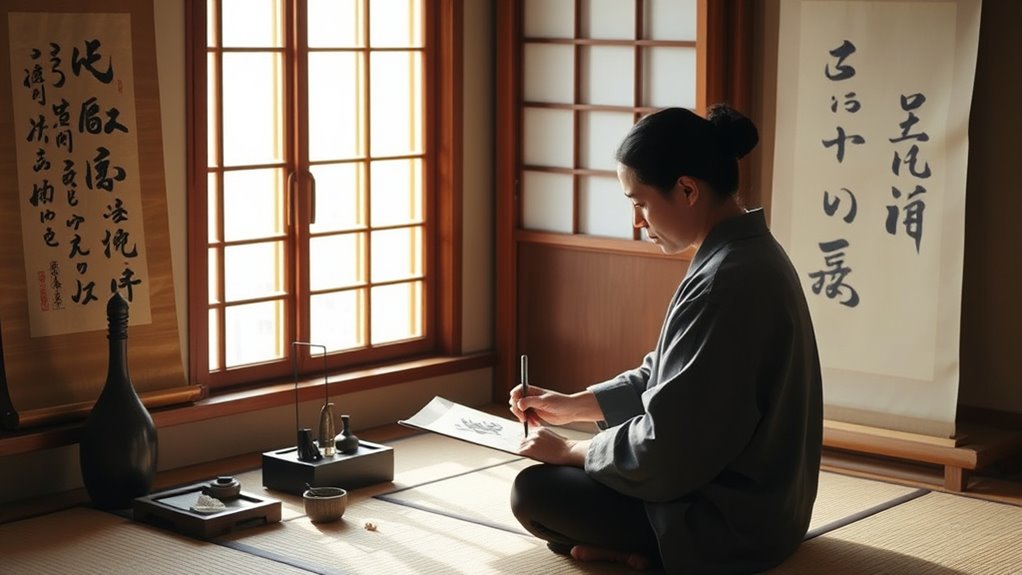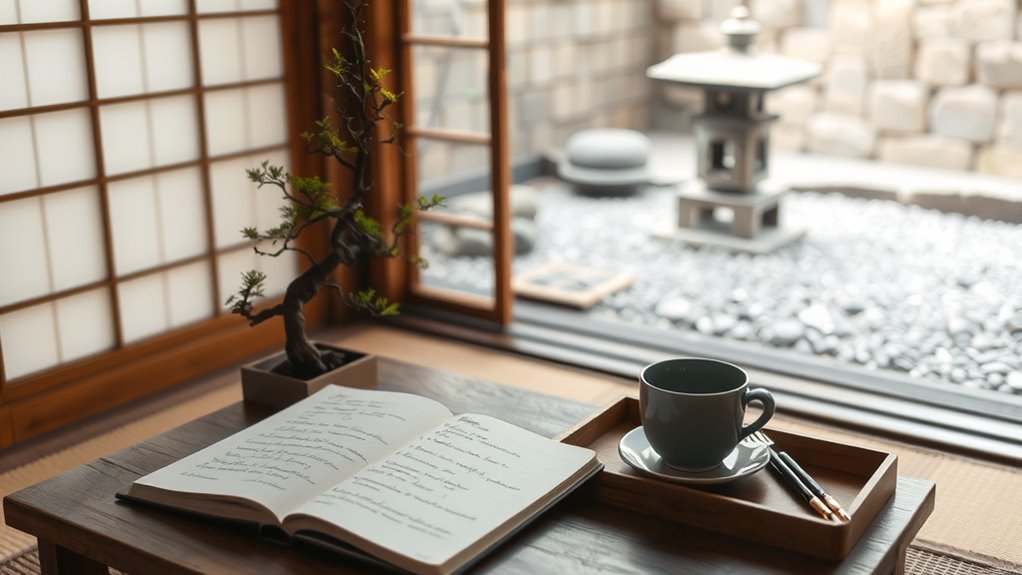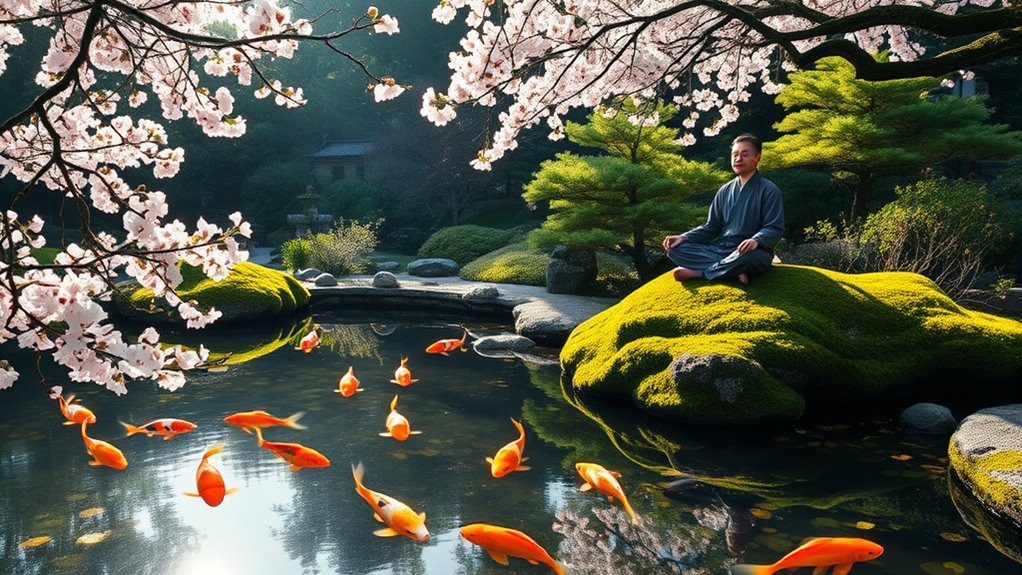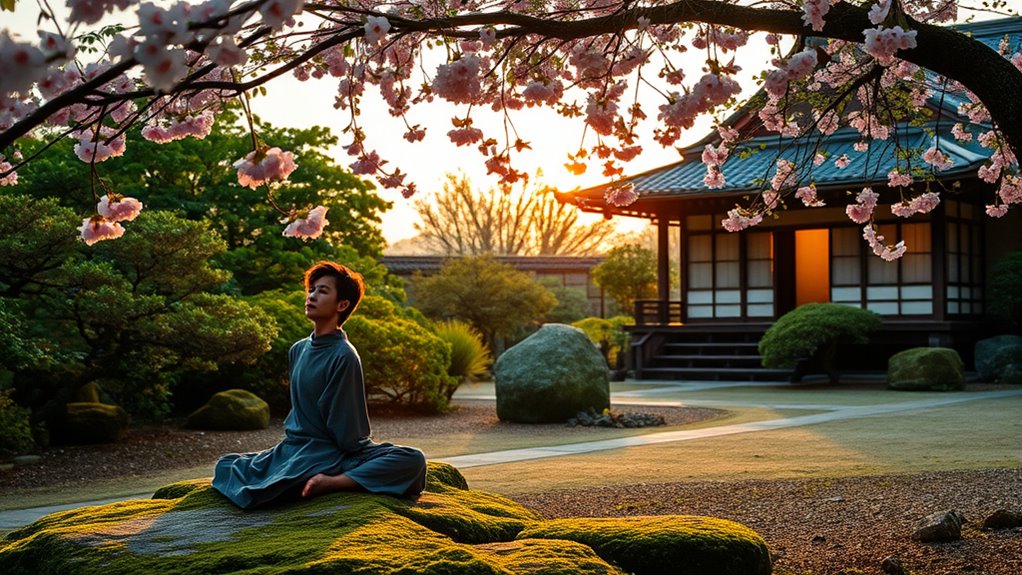Ikigai is a Japanese concept that helps you find a purposeful career by balancing what you love, what society needs, what you’re skilled at, and what can sustain you financially. It encourages self-reflection, aligning your passions, values, and strengths with meaningful work. By exploring these areas, you can create a fulfilling life aligned with your true purpose. Stick around, and you’ll discover how to incorporate ikigai into your daily routine and career.
Key Takeaways
- Ikigai is a Japanese concept emphasizing purpose, fulfillment, and harmony, guiding individuals toward meaningful careers aligned with personal passions and societal needs.
- It is based on four pillars: passion, mission, vocation, and profession, promoting balance between personal interests, societal contribution, skills, and income.
- Identifying ikigai involves self-reflection on passions, talents, community needs, and activities that energize and bring joy.
- The model encourages aligning career choices with core values, strengths, and societal impact to achieve a fulfilling, purpose-driven life.
- Practical strategies for cultivating ikigai include mindfulness, community engagement, creative hobbies, and ongoing self-awareness and reflection.
Understanding the Concept of Ikigai

While the word “ikigai” might be unfamiliar to some, it simply means your reason for being or the purpose that gives your life meaning. Its cultural significance in Japan reflects a deep appreciation for finding joy and fulfillment in everyday life. The philosophical origins trace back centuries, rooted in Japanese traditions that emphasize harmony, balance, and self-awareness. Ikigai isn’t just a vague concept; it’s a guiding principle that encourages you to seek purpose through what you love, what you’re good at, what the world needs, and what you can be paid for. Understanding these roots helps you recognize that ikigai isn’t merely about career success but about cultivating a meaningful life aligned with your core values. Additionally, concepts like floating on water demonstrate how water can symbolize tranquility and balance, which are essential aspects of the ikigai philosophy. Regular reflection on personal growth can help deepen your understanding of your purpose and bring more fulfillment to your life. Incorporating lifestyle balance strategies that focus on both personal and professional fulfillment supports a more holistic pursuit of ikigai. Engaging in meaningful relationships and community involvement can enrich your sense of purpose and contribute to overall well-being. Embracing creative practice and cultivating resilience through embracing failure can also deepen your understanding of your purpose and bring more fulfillment to your life.
The Four Pillars of Ikigai: Passion, Mission, Vocation, and Profession

The concept of ikigai is often best understood through its four fundamental pillars: passion, mission, vocation, and profession. These pillars help you balance what you love, what the world needs, what you can be paid for, and what you’re good at. Recognizing how they interconnect can guide your career change or deepen your cultural understanding of purpose. Here’s a quick view of the pillars:
| Passion | Mission | Vocation |
|---|---|---|
| What you love | What the world needs | What you can be paid for |
| Personal fulfillment | Social contribution | Practical value |
This framework emphasizes that a meaningful career isn’t just about money—it’s about aligning personal passion with cultural significance and societal impact. Understanding the quality assessment of your skills and interests can further refine how you integrate these pillars into your career path. Exploring sound design techniques and tools can help you develop the technical proficiency needed to pursue a vocation aligned with your passions. Additionally, exploring tea accessories and merchandise can serve as a fulfilling pursuit that combines passion and craftsmanship, illustrating how personal interests can evolve into meaningful vocations. Developing a growth mindset can also support continuous learning and adaptation within these pillars, fostering resilience and innovation in your career journey.
How to Identify Your Personal Ikigai

To find your personal Ikigai, start by reflecting on your passions and talents—what activities make you feel alive and skilled. Next, notice the needs around you that align with these strengths, as serving society can bring purpose. Additionally, exploring analytical cookies can help you understand your habits and preferences better, guiding you toward a more fulfilling career path. Recognizing fetal movements can also help you connect more deeply with your evolving purpose and goals. Incorporating crochet styles for locs into your creative expression can further enrich your understanding of what brings you joy and fulfillment. Understanding self watering plant pots can serve as a metaphor for nurturing your personal growth and maintaining balance in your life. Checking the SeaWorld operating hours can also provide insight into planning your leisure activities around your personal balance and well-being.
Reflect on Passions and Talents
Have you ever wondered what truly drives you? Reflecting on your passions and talents helps you uncover your ikigai by highlighting what sparks personal growth and creative expression. Think about activities that make you lose track of time or skills you excel at effortlessly. These are clues to what motivates you deep down. Consider moments when you felt most alive and engaged; they reveal where your passions lie. Recognizing your unique talents enables you to pursue paths that not only fulfill you but also foster continuous improvement. By understanding what excites and energizes you, you set a foundation for a purpose-driven career. This reflection helps align your work with what you genuinely love and are good at, bringing meaning into your everyday life. Additionally, exploring unique and wicked planters can inspire innovative ways to express your creativity and passions through indoor gardening. Embracing anime movies can also serve as a source of inspiration, opening your mind to diverse storytelling styles that fuel your passion for creative pursuits. To further refine your sense of purpose, consider exploring dog names that resonate with your personality, as they can serve as a playful reflection of your identity and values. Incorporating mindfulness practices into your routine can enhance your self-awareness and support your journey toward discovering your ikigai. Moreover, understanding the benefits of glycolic acid can motivate you to pursue skincare routines that promote personal wellness and confidence.
Recognize Society’s Needs
Understanding your passions and talents provides a strong foundation, but aligning them with society’s needs helps you find a deeper purpose. To do this, consider cultural perspectives that shape how communities define value and contribution. Recognize societal expectations by observing what issues or challenges are prioritized locally and globally. Pay attention to conversations, policies, and community initiatives that reflect collective needs. Your awareness of these factors guides you toward areas where your skills can make a meaningful impact. By comprehending society’s needs, you ensure your efforts are relevant and appreciated. Additionally, being aware of interior elements within communities can reveal opportunities for meaningful engagement. This alignment not only benefits others but also deepens your sense of ikigai, connecting personal fulfillment with a sense of contribution to the world around you.
Find What Brings Joy
Discovering what brings you joy is an essential step in finding your personal ikigai. To identify these passions, pay attention to activities that make you lose track of time or leave you feeling energized. Reflect on moments when you feel most alive and fulfilled. Consider trying:
- Practicing mindful shopping, focusing on items that truly resonate with you rather than impulsive purchases
- Connecting with nature through walks, hikes, or outdoor activities that restore your sense of peace
- Engaging in hobbies that spark curiosity and creativity, whether it’s painting, gardening, or volunteering
- Regular self-assessment helps you recognize how your passions align with your personal growth and purpose. Recognizing your emotional well-being can also guide you toward activities that improve your overall happiness and fulfillment. Incorporating elements of your environment, such as a calming space or personal touches inspired by a farmhouse bedroom, can enhance your sense of comfort and joy. Developing AI-powered insights into your habits can further support your journey of self-discovery and growth. Additionally, understanding child development principles can help you foster a nurturing environment that promotes your well-being and resilience.
The Role of Self-Reflection in Finding Purpose

Self-reflection plays a crucial role in uncovering your true purpose, as it allows you to examine your passions, values, and strengths with honesty. By developing self-awareness, you gain clarity about what truly motivates you and where your talents lie. Engaging in honest inner dialogue helps you identify patterns, beliefs, and areas for growth. This process encourages you to pause and evaluate whether your current path aligns with your deeper purpose or needs adjustment. Regular self-reflection sharpens your understanding of what matters most, guiding you toward a career that feels meaningful. It’s not about perfection but about staying connected to your authentic self. Ultimately, this ongoing inner exploration empowers you to make conscious choices that bring purpose and fulfillment into your professional life.
Practical Steps to Align Your Career With Your Ikigai

To effectively align your career with your ikigai, start by clarifying your core passions, values, and strengths through targeted reflection and assessment. This clarity will help you identify opportunities for growth and meaningful work. Consider these practical steps:
- Prioritize work-life balance by setting boundaries that support your well-being and prevent burnout.
- Evaluate your current career path and explore potential shifts that better match your ikigai.
- Seek new opportunities or roles that leverage your strengths and align with your passions, even if it means making deliberate career shifts.
Benefits of Living a Life Guided by Ikigai

Living by your ikigai can boost your overall happiness and sense of well-being. When your work aligns with your passions and values, you’ll find greater fulfillment in everyday life. This purpose-driven approach helps you feel more satisfied and motivated each day.
Enhanced Well-being and Happiness
Have you ever wondered why some people seem genuinely content and energized, even amid life’s challenges? Living with ikigai enhances your well-being and happiness by fostering a positive mindset. When you engage in mindfulness practices, you stay present and reduce stress, boosting emotional resilience. Community involvement gives you a sense of belonging and purpose, strengthening social bonds. Additionally, discovering your ikigai encourages you to focus on activities that bring joy and fulfillment. This alignment creates a ripple effect, promoting mental clarity and emotional stability. Embracing these principles can lead to a more optimistic outlook, greater life satisfaction, and increased overall happiness. By integrating ikigai into your daily routine, you nurture your mind, body, and spirit for a more balanced, joyful life.
Greater Life Fulfillment
When you align your daily actions with your ikigai, you experience a profound sense of fulfillment that goes beyond superficial achievements. This alignment enhances your career development by giving you clear purpose and motivation, making work more meaningful. Living this way also taps into the cultural significance of ikigai in Japan, where it’s seen as a path to long-term happiness. By pursuing work that resonates with your core values and passions, you cultivate a deeper sense of life satisfaction. This holistic approach helps you see your career as part of a larger purpose, fostering resilience and contentment. Ultimately, embracing ikigai guides you toward a more fulfilled life, where your career contributes to a sense of overall well-being and personal growth.
Overcoming Challenges in Pursuing Your Ikigai

Pursuing your ikigai often involves maneuvering obstacles that can shake your confidence and slow your progress. Challenges like career shifts and cultural adaptations test your resilience and clarity of purpose. To overcome these hurdles, consider these strategies:
Overcoming obstacles on your ikigai journey requires flexibility, cultural awareness, and supportive networks.
- Embrace flexibility during career transitions by exploring new roles aligned with your passions.
- Cultivate cultural awareness to better navigate environments different from your own.
- Seek support networks that understand your journey and offer guidance.
Incorporating Ikigai Into Your Daily Routine

Integrating ikigai into your daily routine transforms your approach to work and life, making purpose a constant companion. Start by practicing mindfulness regularly—pause during the day to focus on your breath or observe your surroundings. This cultivates awareness and helps you stay connected to your passions and values. Incorporate daily gratitude by reflecting on what you’re thankful for each morning or evening; this shifts your mindset toward positivity and purpose. Small habits like journaling your goals or taking moments of stillness reinforce your ikigai. Consistency is key: by intentionally weaving mindfulness practices and gratitude into your day, you create a foundation for a more meaningful, fulfilling life aligned with your purpose.
Frequently Asked Questions
Can Ikigai Change Over Time?
Yes, your sense of purpose can change over time. As you experience personal growth and face new challenges, your passions and values may shift, leading to a redefinition of what feels meaningful. Cultural adaptation also influences this process, helping you reassess your ikigai in different environments. Embracing these changes allows you to stay aligned with your evolving goals and find continued fulfillment in your journey.
Is Ikigai Relevant Outside Japanese Culture?
You might wonder if ikigai is relevant outside Japanese culture. Its core idea of finding purpose and fulfillment has strong cultural adaptability, allowing it to resonate universally. While rooted in Japanese traditions, ikigai’s principles of self-awareness, passion, and contributing meaningfully can apply across diverse cultures. Its universal applicability helps people worldwide seek purpose, making it a valuable framework regardless of cultural background.
How Long Does It Typically Take to Find Ikigai?
Finding your ikigai varies for each person; it often takes months or even years. You should prioritize personal reflection and observe your daily habits to gain insights into what truly motivates you. Consistently engaging in self-awareness helps you uncover your purpose. Remember, patience is key—this journey isn’t rushed, and understanding your ikigai deepens as you stay committed to exploring what makes you feel fulfilled.
Can Ikigai Be Different for Each Life Stage?
You might discover your ikigai changes more than the seasons, because personal fulfillment evolves with each life stage. Societal expectations can shift, making what once felt right no longer resonate. Embracing this fluidity helps you stay aligned with your true purpose. Recognizing that ikigai adapts over time allows you to pursue meaningful paths at every age, ensuring your sense of fulfillment stays vibrant and authentic throughout your journey.
What if My Passions Conflict With Practical Needs?
When balancing passions with practical needs, you might feel conflicted, but it’s possible to find harmony. Focus on balancing passions and financial stability by exploring ways to turn your passions into viable income sources or combining them with your current job. Prioritize your needs while gradually pursuing what excites you, ensuring you maintain stability as you work toward a more fulfilling career. Flexibility and strategic planning are key.
Conclusion
Embracing your ikigai means you’re planting seeds today for a fulfilling tomorrow. Like a wise gardener tending to blooming flowers, nurture your passions and purpose daily. Remember, “The journey of a thousand miles begins with a single step.” Stay committed to self-reflection and action, and you’ll find your life blossoming with meaning and joy. Your purposeful career awaits—just take that first step today.









